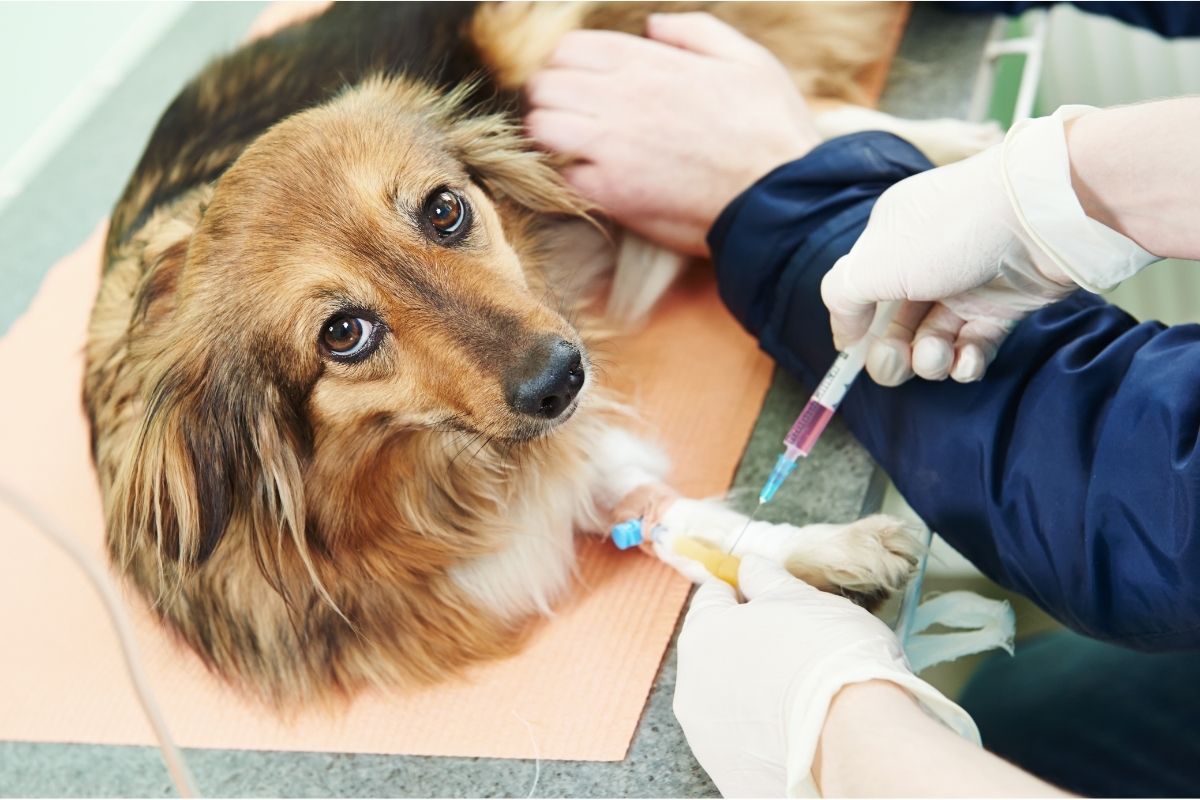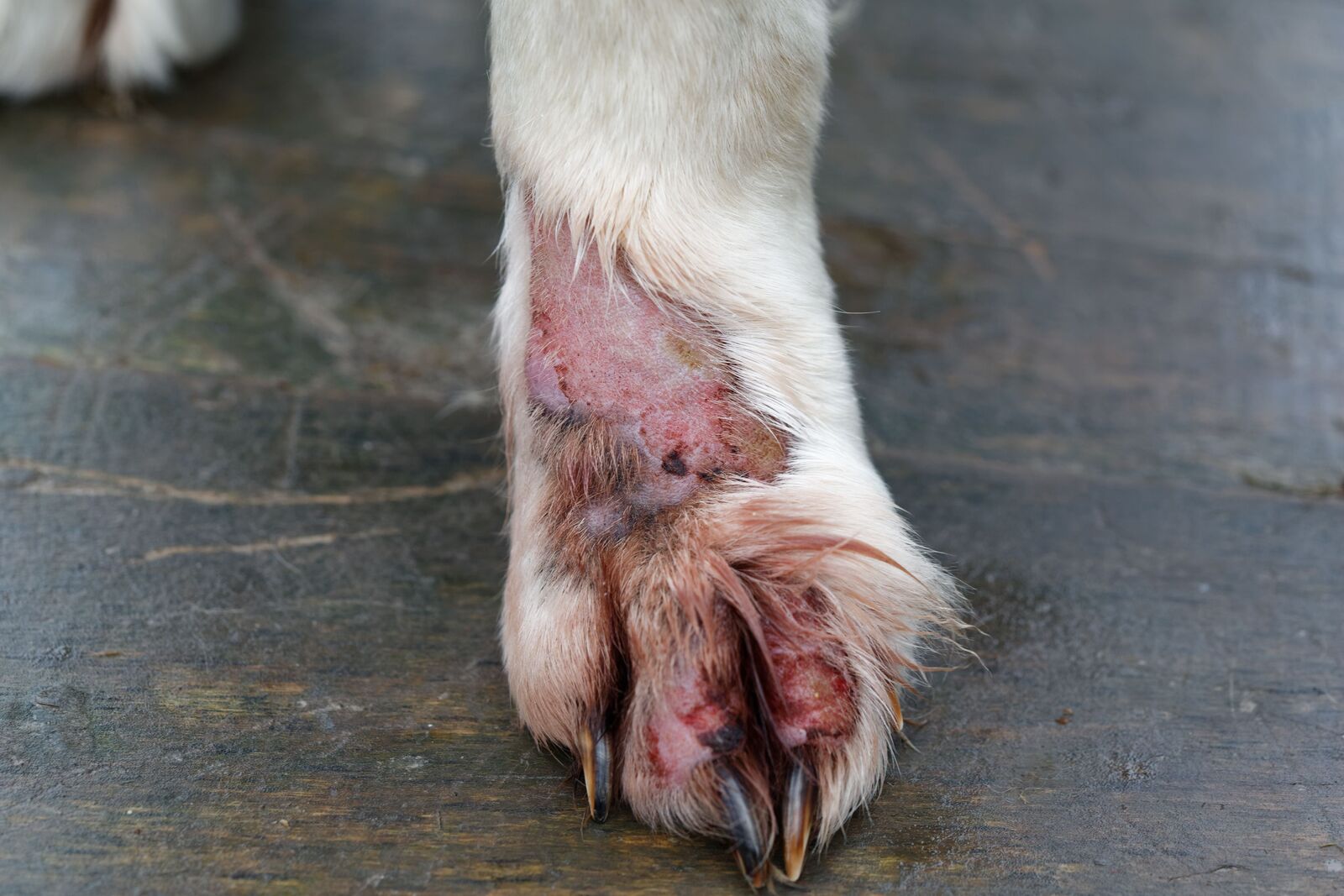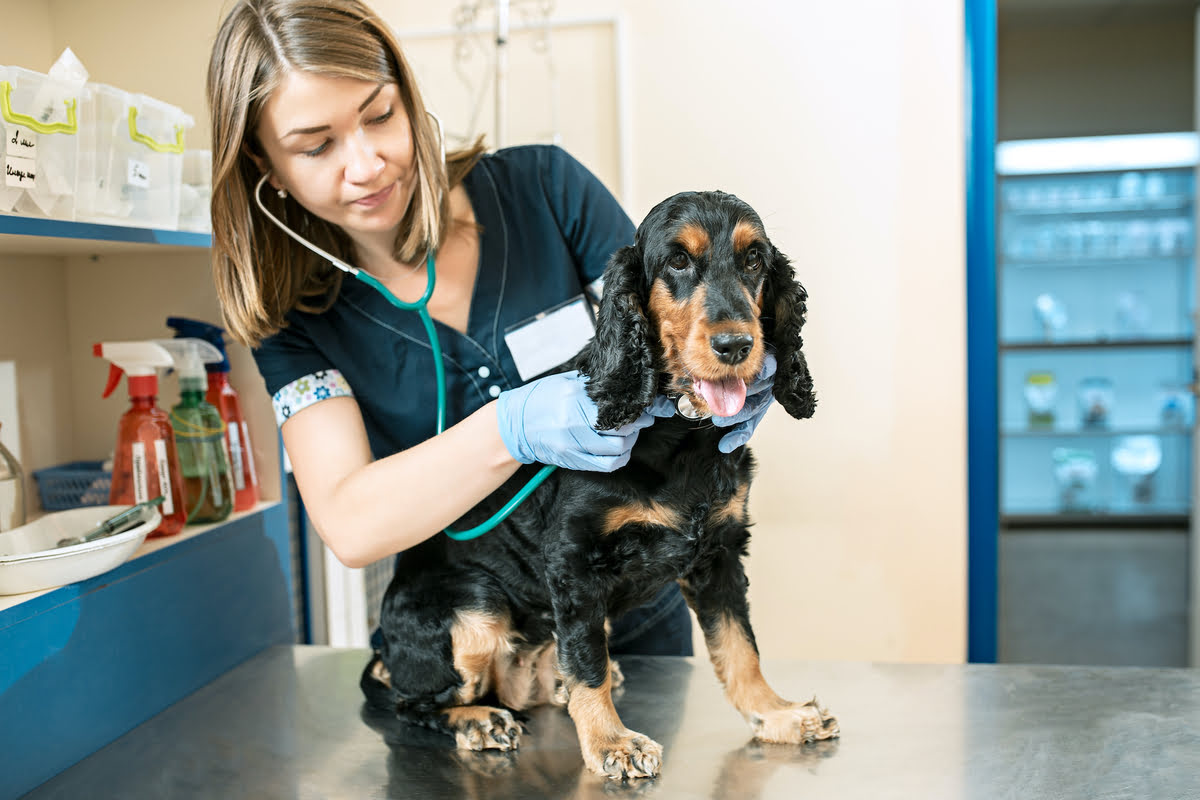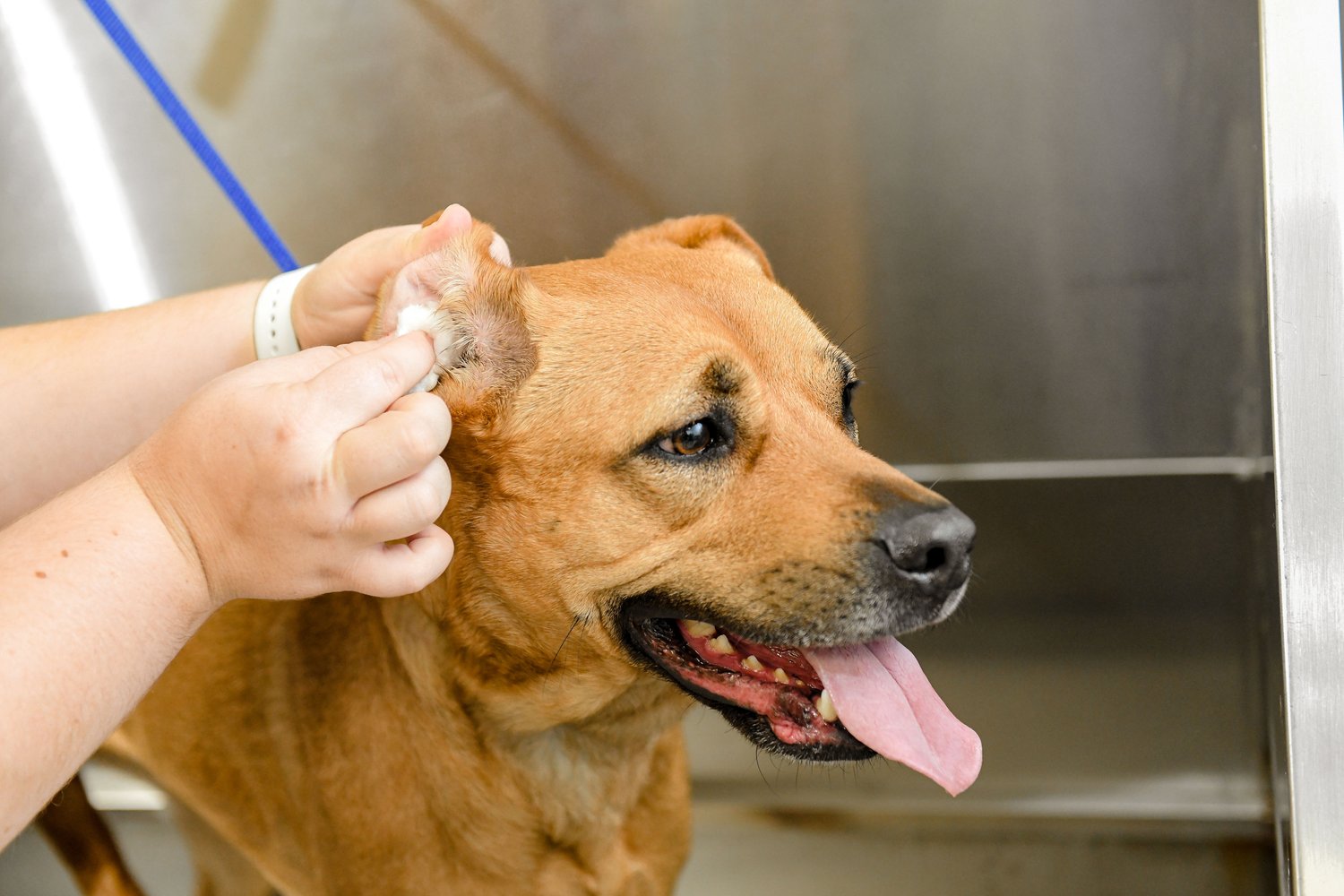Home>Health & Wellness>Common Health Issues>What Causes Blood Cancer In Dogs


Common Health Issues
What Causes Blood Cancer In Dogs
Published: February 5, 2024
Learn about the common health issues that can lead to blood cancer in dogs and how to recognize the symptoms. Understand the causes and risk factors for this serious condition.
(Many of the links in this article redirect to a specific reviewed product. Your purchase of these products through affiliate links helps to generate commission for Pawsomeoldies.com, at no extra cost. Learn more)
Table of Contents
Introduction
Blood cancer, also known as hematopoietic neoplasia, is a serious and potentially life-threatening condition that can affect our beloved canine companions. This type of cancer originates in the blood-forming tissues, such as the bone marrow, and can manifest in various forms, including leukemia, lymphoma, and myeloma. Understanding the underlying causes of blood cancer in dogs is crucial for early detection, effective treatment, and ultimately, the well-being of our furry friends.
The development of blood cancer in dogs can be influenced by a combination of genetic predisposition, environmental factors, and immune system disorders. While some breeds may have a higher susceptibility to certain types of blood cancer due to genetic factors, environmental elements such as exposure to toxins and radiation can also play a significant role in the onset of this condition. Furthermore, immune system disorders can impact the body's ability to recognize and eliminate abnormal cells, potentially contributing to the development of blood cancer.
By delving into the intricate interplay of genetics, environmental factors, and immune system disorders, we can gain a deeper understanding of the multifaceted nature of blood cancer in dogs. This knowledge not only empowers us to recognize potential risk factors but also underscores the importance of regular veterinary check-ups and proactive measures to safeguard our canine companions against this formidable disease.
Read more: What Causes Sarcoma Cancer In Dogs
Genetics and Blood Cancer
Genetics plays a pivotal role in the development of blood cancer in dogs. Certain breeds have been identified as having a higher predisposition to specific types of blood cancer, highlighting the influence of genetic factors. For instance, Golden Retrievers are more susceptible to lymphoma, while Boxers have a higher incidence of mast cell tumors, underscoring the breed-specific genetic predisposition to blood cancer.
In addition to breed-related genetic predispositions, specific gene mutations have been linked to an increased risk of blood cancer in dogs. These mutations can disrupt the normal regulation of cell growth and division, leading to the uncontrolled proliferation of abnormal cells characteristic of cancer. For example, mutations in the c-MYC gene have been associated with the development of lymphoma in dogs, emphasizing the intricate genetic underpinnings of this disease.
Furthermore, advancements in genetic research have shed light on the hereditary nature of certain forms of blood cancer in dogs. Inherited genetic mutations can predispose dogs to hematopoietic neoplasia, potentially passing down the susceptibility to future generations. Understanding the genetic basis of blood cancer not only aids in identifying at-risk individuals but also paves the way for targeted genetic screening and counseling to mitigate the impact of hereditary factors.
Moreover, the intricate interplay between genetic predisposition and environmental factors can significantly influence the development of blood cancer in dogs. While genetic susceptibility sets the stage for potential cancer development, environmental triggers such as exposure to carcinogens or viral infections can act as catalysts, exacerbating the risk of blood cancer manifestation in genetically predisposed individuals.
By unraveling the intricate genetic landscape of blood cancer in dogs, we can gain valuable insights into the underlying mechanisms driving this complex disease. This knowledge not only underscores the importance of breed-specific genetic screening and proactive management but also highlights the potential for targeted genetic interventions to mitigate the impact of genetic predisposition on the development of blood cancer in our canine companions.
Environmental Factors and Blood Cancer
Environmental factors play a significant role in the development of blood cancer in dogs, exerting influence through various avenues such as exposure to carcinogens, radiation, and viral infections. Carcinogens, which are substances capable of causing cancer, can be found in a wide array of environmental sources, including industrial chemicals, tobacco smoke, and certain pesticides. Prolonged or repeated exposure to these carcinogens can disrupt normal cellular processes, leading to the initiation and progression of blood cancer in dogs.
Furthermore, radiation, whether from natural sources or human activities, has been implicated as a potential environmental factor contributing to the development of blood cancer in dogs. Ionizing radiation, in particular, has the ability to induce genetic mutations and chromosomal abnormalities, which can predispose dogs to hematopoietic neoplasia. Additionally, viral infections, such as the canine leukemia virus and the canine lymphoma virus, have been linked to an increased risk of blood cancer in dogs. These viruses can directly affect the genetic material of cells, leading to malignant transformation and the onset of blood cancer.
Moreover, environmental pollutants, including heavy metals, solvents, and air pollutants, have been associated with an elevated risk of blood cancer in dogs. These pollutants can exert their detrimental effects through various mechanisms, including oxidative stress, DNA damage, and immune system modulation, ultimately contributing to the development of hematopoietic neoplasia.
It is important to note that the impact of environmental factors on the development of blood cancer in dogs is multifaceted and can vary based on individual susceptibility and cumulative exposure. Additionally, the interplay between genetic predisposition and environmental factors underscores the complex nature of blood cancer etiology in dogs, highlighting the need for comprehensive risk assessment and proactive environmental management strategies.
By recognizing the role of environmental factors in the development of blood cancer in dogs, we can take proactive measures to minimize exposure to potential carcinogens, mitigate the impact of environmental pollutants, and implement targeted vaccination and preventive measures against viral infections. This holistic approach not only addresses the multifaceted nature of blood cancer etiology but also underscores the importance of environmental stewardship in safeguarding the health and well-being of our canine companions.
Immune System Disorders and Blood Cancer
Immune system disorders play a significant role in the development of blood cancer in dogs, contributing to the intricate web of factors that influence the onset and progression of hematopoietic neoplasia. The immune system serves as a critical defense mechanism against abnormal cells and pathogens, playing a pivotal role in surveillance, recognition, and elimination of potentially harmful entities. However, when the immune system becomes compromised or dysregulated, it can inadvertently create an environment conducive to the development of blood cancer.
One of the key mechanisms through which immune system disorders can impact the development of blood cancer in dogs is through impaired immune surveillance. The immune system's ability to identify and eliminate abnormal cells is essential for preventing the unchecked proliferation of malignant cells. However, in cases where the immune surveillance is compromised, such as in certain immune system disorders, abnormal cells may evade detection and clearance, leading to the accumulation and progression of cancerous cells.
Furthermore, immune system disorders can disrupt the delicate balance of immune cell populations, leading to aberrant immune responses and inflammatory processes that can promote the development of blood cancer. Dysregulated immune responses can create a pro-inflammatory microenvironment that fosters the survival and proliferation of malignant cells, contributing to the progression of hematopoietic neoplasia in dogs.
Additionally, certain immune system disorders, such as autoimmune conditions, can result in the production of autoantibodies and immune complexes that can inadvertently contribute to the development of blood cancer. The dysregulated immune responses characteristic of autoimmune disorders can lead to the generation of antibodies that target self-antigens, potentially creating a milieu conducive to the initiation and progression of blood cancer.
Moreover, the intricate interplay between immune system disorders and genetic predisposition underscores the multifaceted nature of blood cancer etiology in dogs. Genetic factors that influence immune function can intersect with immune system disorders, further shaping the risk of blood cancer development in canine companions.
By understanding the intricate relationship between immune system disorders and blood cancer, we can underscore the importance of immune system health in mitigating the risk of hematopoietic neoplasia in dogs. Proactive measures to support immune function, such as balanced nutrition, regular exercise, and preventive healthcare, can play a pivotal role in maintaining immune system integrity and reducing the risk of blood cancer development in our beloved canine companions.
Conclusion
In conclusion, the development of blood cancer in dogs is a multifaceted process influenced by a complex interplay of genetic predisposition, environmental factors, and immune system disorders. The intricate genetic landscape of blood cancer underscores the breed-specific predisposition and hereditary nature of certain forms of hematopoietic neoplasia. Understanding the genetic basis of blood cancer not only aids in identifying at-risk individuals but also paves the way for targeted genetic screening and counseling to mitigate the impact of hereditary factors.
Environmental factors, including exposure to carcinogens, radiation, viral infections, and pollutants, play a significant role in the development of blood cancer in dogs. Prolonged or repeated exposure to carcinogens and radiation can disrupt normal cellular processes, while viral infections and environmental pollutants can contribute to the initiation and progression of hematopoietic neoplasia. Recognizing the impact of environmental factors on the development of blood cancer underscores the importance of comprehensive risk assessment and proactive environmental management strategies to safeguard the health and well-being of our canine companions.
Furthermore, immune system disorders can create an environment conducive to the development of blood cancer in dogs. Impaired immune surveillance, dysregulated immune responses, and autoimmune conditions can inadvertently contribute to the initiation and progression of hematopoietic neoplasia. The intricate relationship between immune system disorders and genetic predisposition highlights the multifaceted nature of blood cancer etiology in dogs, emphasizing the importance of immune system health in mitigating the risk of this formidable disease.
By unraveling the complex web of genetic, environmental, and immune-related factors that influence the development of blood cancer in dogs, we can gain valuable insights into the underlying mechanisms driving this disease. This knowledge not only empowers us to recognize potential risk factors but also underscores the importance of regular veterinary check-ups, proactive environmental management, and measures to support immune function. Ultimately, a comprehensive understanding of the causes of blood cancer in dogs is essential for early detection, effective treatment, and the overall well-being of our beloved canine companions.















